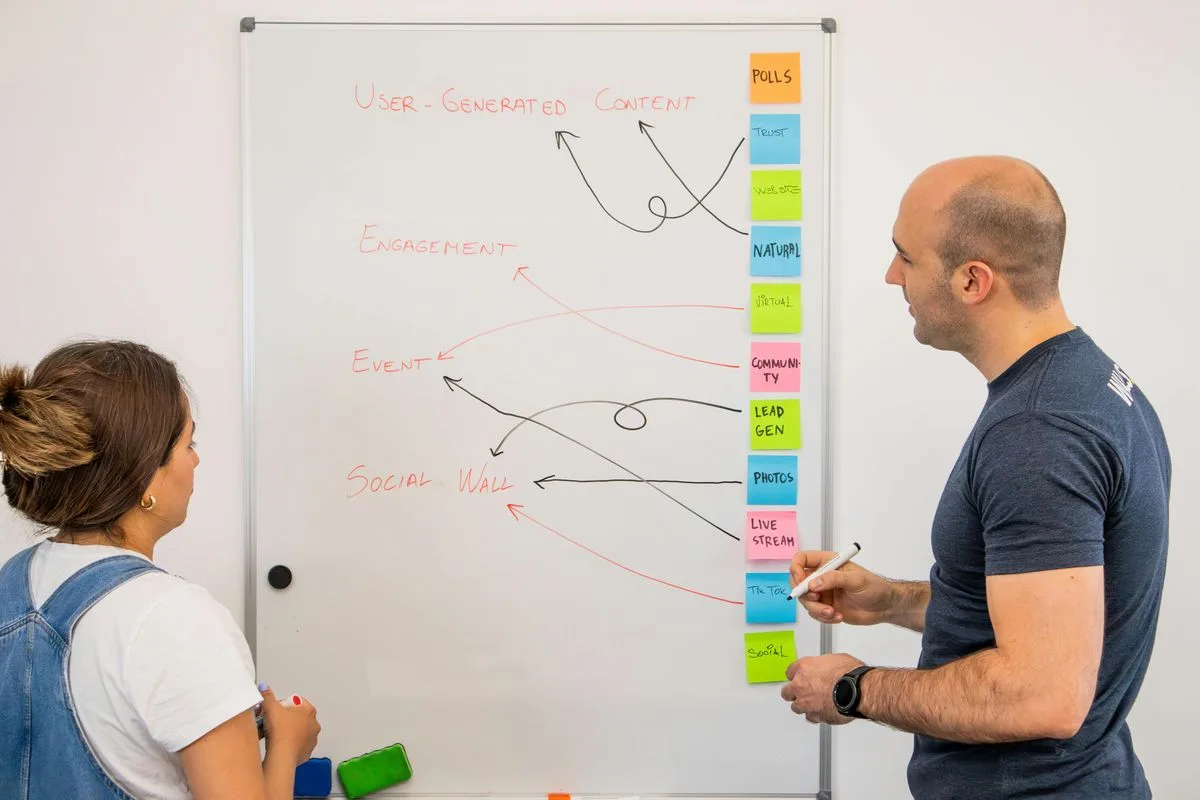Growleady Team
Lead Generation Experts
Winning B2B Startup Ideas: Insights from Industry Experts
Uncover B2B startup strategies with this guide. Learn how to use market research, tech trends, and validation methods to develop ideas for success.

Dreaming of launching your own B2B startup but can’t pin down the perfect idea? You’re not alone! Generating innovative B2B startup concepts is challenging but can be the start of your next big venture.
There’s always room for fresh solutions in the business world, but how do you find those golden opportunities? With proven strategies, you can generate and validate B2B ideas that might revolutionize industries.
Let’s delve into the art and science of B2B idea generation. Whether you're an experienced business pro or a new entrepreneur, this guide is packed with insights to help kickstart your entrepreneurial journey.
Understanding the B2B Landscape
The B2B (Business-to-Business) world presents unique opportunities and challenges for startups. Understanding the key differences between B2B and B2C markets is crucial for entrepreneurs looking to venture into the B2B space.
Key Differences Between B2B and B2C Markets
B2B and B2C markets have distinct characteristics that shape how startups approach their business strategies:
Market Size and Demand:
B2B markets typically have smaller, more focused customer bases compared to B2C markets. This concentrated audience often consists of knowledgeable professionals, making it easier for B2B startups to establish credibility through targeted marketing efforts. In contrast, B2C startups face larger, more diverse markets, which can be challenging to penetrate initially.
Customer Pain Points:
B2B startups excel at solving specific, high-value problems for their customers. These issues often involve significant spending and directly impact a company's bottom line. For example, a B2B startup might develop software that streamlines supply chain management, potentially saving clients millions of dollars annually. B2C startups, on the other hand, address broader consumer needs, such as convenience or entertainment.Sales Cycle and Decision-Making Process:
The B2B sales cycle is typically longer and more complex than B2C. Multiple stakeholders are often involved in B2B purchasing decisions, requiring startups to navigate through various levels of approval. This extended process allows B2B startups to build stronger relationships with potential clients. In B2C markets, decisions are usually made more quickly by individual consumers.Customer Relationships:
B2B startups often develop long-term partnerships with their clients, providing ongoing support and customized solutions. This relationship-driven approach contrasts with B2C markets, where transactions are generally more transient and less personalized.Pricing and Value Proposition:
B2B products and services are often priced higher than B2C offerings due to their specialized nature and the value they provide to businesses. B2B startups need to clearly demonstrate ROI and long-term benefits to justify their pricing. B2C pricing is typically more straightforward and based on individual consumer purchasing power.Marketing Strategies:
B2B marketing focuses on building thought leadership, showcasing industry expertise, and demonstrating tangible business benefits. Content marketing, whitepapers, and case studies are common tactics. B2C marketing relies more on emotional appeal, brand awareness, and mass-market advertising.Customer Feedback and Validation:
B2B startups benefit from direct customer feedback through conversations and prototype testing. This hands-on approach allows for rapid iteration and product improvement. B2C startups often rely on market trends, focus groups, and general consumer preferences to guide their product development.Scalability and Growth:
While B2B markets may have fewer potential customers, the value per customer is often higher. B2B startups can achieve significant growth by securing a handful of key clients. B2C startups typically need to acquire a much larger customer base to achieve similar revenue levels.Industry Knowledge Requirements:
B2B startups often require deep industry expertise to address specific business challenges effectively. Founders and team members need to be well-versed in their target industry's nuances. B2C startups may have more flexibility in terms of the background knowledge required.Regulatory Considerations:
B2B startups, especially those in industries like finance, healthcare, or government services, often face stricter regulatory requirements. Compliance with industry standards and data security protocols is crucial. B2C startups may have fewer regulatory hurdles, depending on their specific product or service.
Understanding these key differences helps B2B startup founders tailor their approach to idea generation, product development, and go-to-market strategies. By recognizing the unique aspects of the B2B world, entrepreneurs can better position themselves for success in this challenging yet rewarding market.
Identifying Pain Points in B2B Industries
Identifying pain points in B2B industries is crucial for generating successful startup ideas. By pinpointing significant problems that businesses face, you'll uncover opportunities for innovative solutions that can drive substantial revenue.
Conducting Market Research

To effectively identify B2B pain points, you'll need to conduct thorough market research:
Analyze industry reports and trends to spot recurring challenges.
Survey potential customers to understand their most pressing issues.
Attend industry conferences and trade shows to gain insights from professionals.
Monitor online forums and social media discussions related to your target industry.
Conduct competitor analysis to identify gaps in existing solutions.
By diving deep into market research, you'll gain a comprehensive understanding of the B2B world and the problems that need solving.
Leveraging Industry Experience
Your personal experience in the B2B sector can be a goldmine for startup ideas:
Reflect on past work experiences and challenges you've faced.
Connect with former colleagues to discuss common pain points.
Analyze internal tools or processes you've developed that could benefit other companies.
Consider problems you've encountered repeatedly across different organizations.
Look for inefficiencies in your current workplace that could be addressed with innovative solutions.
By tapping into your industry knowledge, you'll be able to identify authentic problems that resonate with potential customers. Remember, the most successful B2B startups often stem from founders' firsthand experiences in their target markets.
Exploring Emerging Technologies for B2B Solutions
Emerging technologies offer a goldmine of opportunities for B2B startups. By staying ahead of the curve and identifying innovative applications, you'll position yourself to solve complex business problems and create valuable solutions.
AI and Machine Learning Applications
AI and machine learning are transforming B2B operations across industries. Here's how you can leverage these technologies for your startup ideas:
Process Automation: Develop AI-powered tools that streamline repetitive tasks in finance, HR, or customer service. For example, create an intelligent document processing system that extracts and categorizes information from invoices, resumes, or contracts.
Predictive Analytics: Build machine learning models that forecast market trends, customer behavior, or equipment maintenance needs. This could include a sales forecasting tool that helps B2B companies optimize their inventory management.
Personalization Engines: Design AI algorithms that tailor product recommendations or content for B2B clients. Consider a platform that customizes marketing materials based on a company's industry, size, and past interactions.
Natural Language Processing: Create chatbots or virtual assistants that handle customer inquiries, schedule appointments, or provide technical support for B2B clients.
Remember, the key is to identify specific pain points in B2B processes where AI and machine learning can provide significant improvements in efficiency, accuracy, or decision-making.
Blockchain and IoT Opportunities
Blockchain and IoT technologies are opening up new avenues for B2B innovation. Here's how you can tap into these emerging fields:
Supply Chain Transparency: Develop blockchain-based solutions that track products from manufacture to delivery, ensuring authenticity and reducing fraud in B2B transactions.
Smart Contracts: Create platforms that automate and enforce contract terms between businesses, reducing the need for intermediaries and speeding up transactions.
IoT-Enabled Asset Management: Design systems that use IoT sensors to monitor and optimize the use of equipment, vehicles, or facilities in B2B settings.
Data Marketplaces: Build secure, blockchain-powered platforms where businesses can buy, sell, or trade valuable data sets while maintaining control over their information.
Predictive Maintenance: Combine IoT sensors with blockchain to create tamper-proof records of equipment performance, enabling more accurate and cost-effective maintenance schedules.
When exploring these technologies, focus on solving real-world B2B problems rather than implementing tech for its own sake. Conduct thorough market research to ensure your solution addresses a genuine need and offers clear value to potential customers.
By staying informed about these emerging technologies and thinking creatively about their applications, you'll be well-positioned to develop innovative B2B startup ideas that can disrupt industries and create lasting value.
Analyzing Trends in B2B Sectors
To uncover promising B2B startup ideas, it's crucial to stay ahead of industry trends. By analyzing shifts in various B2B sectors, you'll identify emerging opportunities and anticipate future needs.
Shifts in Supply Chain Management
Supply chain management is evolving rapidly, presenting numerous opportunities for B2B startups. Here are key trends to watch:
Blockchain for Transparency: Carry out blockchain solutions to enhance supply chain visibility and traceability. This technology allows businesses to track products from origin to delivery, reducing fraud and improving quality control.
AI-Powered Forecasting: Develop AI algorithms that analyze historical data, market trends, and external factors to predict demand accurately. This helps businesses optimize inventory levels and reduce waste.
Sustainable Sourcing: Create platforms that connect businesses with eco-friendly suppliers or develop tools to measure and report on sustainability metrics throughout the supply chain.
Last-Mile Optimization: Design solutions that streamline the final leg of delivery, such as route optimization software or crowd-sourced delivery networks.
Digital Transformation Needs
As businesses accelerate their digital transformation efforts, B2B startups can capitalize on this trend by addressing specific pain points:
Legacy System Integration: Build middleware solutions that help businesses connect outdated systems with modern cloud-based applications. This allows companies to modernize gradually without disrupting operations.
Data Analytics Platforms: Create user-friendly tools that help non-technical employees extract insights from complex data sets. Focus on industry-specific solutions tailored to particular sectors like healthcare or finance.
Cybersecurity for SMBs: Develop affordable, easy-to-carry-out security solutions for small and medium-sized businesses. Consider offerings like automated threat detection or employee training platforms.
Remote Work Enablement: Design collaboration tools that address specific challenges of remote teams, such as virtual whiteboarding for creative sessions or AI-powered meeting assistants for better engagement.
By focusing on these trends, particularly in digital transformation and supply chain management, you can position your B2B startup to meet real market demands. Conducting thorough research and leveraging Growleady’s expertise in lead generation can help validate your ideas and ensure they’re ready for development.
Networking and Collaboration for Idea Generation
Networking and collaboration are powerful tools for generating B2B startup ideas. By engaging with industry professionals and potential customers, you'll gain valuable insights and uncover untapped opportunities.
Attending Industry Conferences and Events

Industry conferences and events are goldmines for B2B startup ideas. These gatherings bring together professionals from various sectors, creating an ideal environment for networking and knowledge exchange. Here's how to make the most of these opportunities:
Research event agendas: Choose conferences that align with your interests and target industries. Look for events focusing on emerging technologies or pressing industry challenges.
Prepare targeted questions: Develop a list of questions to ask attendees about their pain points and unmet needs in their businesses.
Engage in panel discussions: Participate actively in Q&A sessions to gain insights from industry leaders and experts.
Visit exhibitor booths: Explore the latest products and services in your field. Identify gaps in current offerings that your startup could fill.
Attend workshops and breakout sessions: These smaller gatherings often provide deeper dives into specific topics, helping you identify niche opportunities.
Network during social events: Informal settings like cocktail hours or networking breaks often lead to candid conversations about industry challenges.
Engaging with Potential Customers
Direct engagement with potential customers is crucial for validating your B2B startup ideas. Here's how to approach this effectively:
Leverage LinkedIn: Use LinkedIn to connect with professionals in your target industry. Join relevant groups and participate in discussions to build relationships.
Conduct informational interviews: Reach out to industry professionals for brief, informal chats about their business challenges. These conversations often reveal valuable insights.
Offer value first: Share relevant content or industry insights with potential customers before asking for their input. This approach builds trust and increases the likelihood of meaningful engagement.
Use cold email strategically: When reaching out via email, personalize your messages and focus on how you can help solve their problems rather than pitching your idea.
Attend industry meetups: Local industry meetups provide opportunities for face-to-face interactions with potential customers in a relaxed setting.
Create surveys: Develop targeted surveys to gather quantitative data about industry pain points. Share these surveys through your professional network and relevant online communities.
Host webinars or virtual roundtables: Organize online events focused on industry trends or challenges. These platforms allow you to engage with multiple potential customers simultaneously.
Offer free consultations: Provide brief, complimentary consultation sessions to potential customers. Use these interactions to gain deeper insights into their needs and pain points.
By actively networking and collaborating with industry professionals, you'll not only generate innovative B2B startup ideas but also build a valuable network of potential customers and partners for your future venture.
Validating Your B2B Startup Ideas
Validating your B2B startup ideas is crucial for ensuring market fit and long-term success. It's about testing your assumptions and gathering real-world feedback before investing significant time and resources into development.
Creating Minimum Viable Products
Minimum Viable Products (MVPs) are the cornerstone of idea validation in the B2B startup world. They're stripped-down versions of your product that allow you to test core functionalities with minimal investment.
To create an effective MVP:
Identify core features: Focus on the essential functions that solve your target customers' main pain points.
Use low-code or no-code tools: Platforms like Bubble, Webflow, or Airtable can help you build functional prototypes quickly.
Carry out analytics: Use tools like Google Analytics or Mixpanel to track user behavior and gather quantitative data.
Set clear success metrics: Define what constitutes validation for your idea, such as user engagement rates or sign-up numbers.
Iterate rapidly: Be prepared to make quick changes based on user feedback and usage data.
Remember, your MVP doesn't need to be perfect. It's a learning tool, not a final product. The goal is to validate your core assumptions about the market need and your solution's effectiveness.
Gathering Feedback from Industry Experts
Industry experts can provide invaluable insights into market needs, potential roadblocks, and improvement areas for your B2B startup idea. Here's how to effectively gather and use their feedback:
Identify relevant experts: Look for professionals with extensive experience in your target industry or with your specific problem area.
Leverage LinkedIn: Use LinkedIn's advanced search features to find and connect with industry leaders. Personalize your connection requests and explain why you're reaching out.
Attend industry conferences: These events are goldmines for networking with experts and potential customers. Prepare an elevator pitch and be ready to discuss your idea succinctly.
Conduct structured interviews: Prepare a set of open-ended questions that probe into the expert's experience with the problem you're solving and their thoughts on your proposed solution.
Host roundtable discussions: Organize small group sessions with 3-5 experts to foster dynamic discussions about your idea and the industry world.
Offer value in return: Consider providing free access to your MVP or offering your expertise in return for their time and insights.
Document feedback systematically: Use tools like Evernote or Notion to organize and analyze the feedback you receive.
Look for patterns: Pay attention to recurring themes or suggestions in the feedback. These often indicate important market needs or potential pitfalls.
Be open to pivots: If multiple experts point out flaws in your idea or suggest alternative approaches, be willing to reconsider your initial concept.
Follow up: Keep experts updated on your progress and how you've incorporated their feedback. This can lead to ongoing relationships and potential partnerships.
By combining a well-crafted MVP with expert feedback, you'll gain a comprehensive understanding of your B2B startup idea's viability. This approach minimizes risk and maximizes your chances of building a product that truly resonates with your target market.
Conclusion
Getting B2B startup ideas requires a blend of industry knowledge, market research, and networking. Focus on emerging technologies and trends while addressing real pain points in the B2B space. Validate your ideas through MVPs and expert feedback to ensure viability.
Remember to stay flexible and open to pivoting based on insights gained. By following these strategies, you'll be well-equipped to identify and develop innovative B2B startup concepts that have the potential to disrupt industries and solve complex business challenges.
Frequently Asked Questions
What are B2B pain points?
B2B pain points are specific challenges or problems that businesses face in their operations or interactions with other businesses. These can include inefficiencies, cost issues, communication gaps, or technological limitations. Identifying and addressing these pain points is crucial for developing successful B2B startup ideas that provide valuable solutions to other businesses.
How can market research help in generating B2B startup ideas?
Market research helps in generating B2B startup ideas by providing insights into industry trends, customer needs, and existing gaps in the market. It involves analyzing competitor offerings, conducting surveys, and studying industry reports. This information allows entrepreneurs to identify unmet needs and opportunities for innovation in the B2B space, leading to more targeted and potentially successful startup ideas.
What emerging technologies are important for B2B startups?
Key emerging technologies for B2B startups include Artificial Intelligence (AI), blockchain, and the Internet of Things (IoT). AI can enhance decision-making and automate processes. Blockchain offers improved transparency and security in transactions and supply chains. IoT enables better data collection and management across interconnected devices, leading to improved efficiency and new service opportunities in various B2B sectors.
What are some effective methods for gathering expert feedback on B2B startup ideas?
Effective methods for gathering expert feedback include structured interviews, roundtable discussions, and offering value in exchange for insights. Entrepreneurs can reach out to industry leaders, conduct one-on-one sessions, or organize small group discussions. Providing value, such as sharing market research or offering early access to products, can incentivize experts to engage more deeply and provide more comprehensive feedback.
How should entrepreneurs approach pivoting their B2B startup idea?
Entrepreneurs should approach pivoting their B2B startup idea with an open mind and based on solid data. They should continuously analyze feedback, market trends, and performance metrics. If the evidence suggests that the current approach isn't viable, they should be willing to make significant changes. Pivoting might involve altering the target market, changing the core product features, or even shifting the entire business model to better address market needs.


